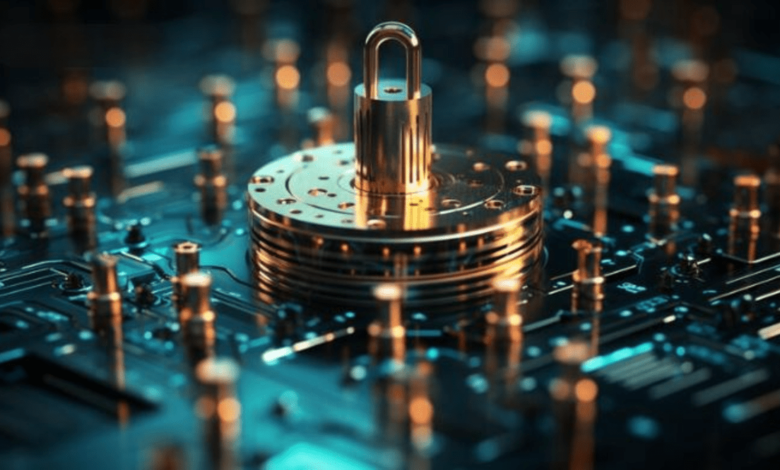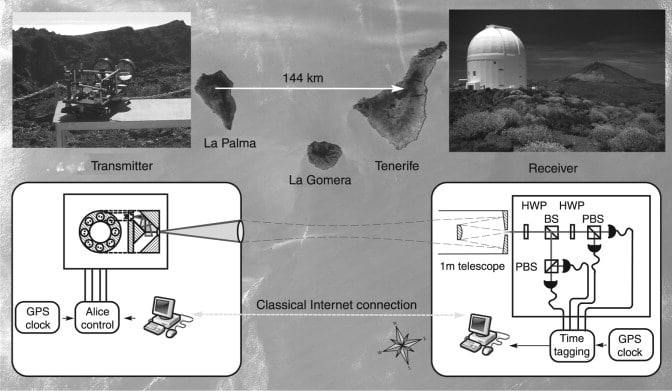Quantum Key Distribution: The Best Secure Communication Technology

In the ever-evolving world of technology, the need for secure communication has never been more critical. As cyber threats grow more sophisticated, traditional encryption methods are becoming increasingly vulnerable. This is where Quantum Key Distribution (QKD) comes into play, offering a groundbreaking approach to secure data transmission. We will examine the nuances of QKD, its guiding principles, its uses, and then prospects it holds for secure communications in this extensive piece.
Understanding Quantum Key Distribution
Quantum Key Distribution is a method of secure communication that uses quantum mechanics principles to exchange encryption keys between parties. The security of QKD lies in the fundamental properties of quantum particles, such as photons, which behave in ways that classical particles do not.
Principles of Quantum Mechanics in QKD

The core of QKD is based on two key principles of quantum mechanics:
Quantum Superposition: Until they are discovered, quantum particles can also exist in several states concurrently.
Quantum Entanglement: Particles can also become entangled, meaning the state of one particle is directly related to the state of another, no matter the distance between them.
These principles ensure that any attempt to eavesdrop on the communication alters the state of the quantum particles, thereby revealing the presence of an intruder.
The BB84 Protocol
The BB84 protocol, first out by Charles Bennett and then Gilles Brassard in 1984, is the most well-known Quantum Key Distribution protocol. It utilizes polarized photons to transmit keys securely. The BB84 protocol operates as follows:
Key Generation: The sender (Alice) generates a random sequence of bits and then encodes each bit into a photon using one of four possible polarizations.
Transmission: Alice sends the polarized photons to the receiver (Bob).
Measurement: Bob measures the incoming photons using randomly chosen polarization bases.
Key Sifting: Alice and Bob compare a subset of their bit sequences over a public channel to detect eavesdropping. If discrepancies are found, the key is discarded, and then process starts over.
Key Distillation: If no eavesdropping is detected, Alice and Bob distill a final secure key from the remaining bits.
Advantages of Quantum Key Distribution
QKD offers several significant advantages over classical encryption methods:
Unconditional Security
The security of QKD is based on the laws of quantum mechanics, which are believed to be unbreakable by any classical or quantum computer. This provides unconditional security, ensuring that the encryption keys cannot be intercepted without detection.
Detection of Eavesdropping
Any attempt to eavesdrop on a QKD system introduces detectable anomalies in the quantum states of the particles. This allows for immediate detection and then termination of compromised key exchanges, maintaining the integrity of the communication.
Long-term Security
As quantum computing advances, many classical encryption methods may become obsolete. QKD, however, remains secure against quantum attacks, making it a future-proof solution for long-term secure communications.
Applications of Quantum Key Distribution
QKD is poised to revolutionize the realm of secure communication, providing unprecedented levels of security through the principles of quantum mechanics. By leveraging the unique properties of quantum particles, QKD ensures that any attempt at eavesdropping can also be detected, making it a highly reliable method for secure data transmission. Here are some notable applications of QKD:
Financial Sector
In the financial sector, the security of transactions and then data protection is paramount. Financial institutions handle a vast amount of sensitive information, from personal client data to complex financial transactions. QKD can also play a crucial role in safeguarding this data. By providing an unbreakable encryption method, QKD can also prevent cyber-attacks and data breaches, ensuring the confidentiality and integrity of financial communications. This level of security can also help in protecting against fraud, maintain customer trust, and comply with stringent regulatory requirements.
Key Benefits for the Financial Sector:
- Improved defense against data breaches and cyberattacks.
- Secure financial transactions and then communications.
- Compliance with regulatory standards for data security.
- Increased customer trust and confidence in financial services.
Government and Military
Government and military communications often involve highly sensitive and classified information that, if intercepted, could have severe implications for national security. Quantum Key Distribution offers a robust solution for protecting these communications from espionage and unauthorized access. By using quantum keys, which are virtually impossible to crack or replicate, governments and military organizations can also ensure that their strategic communications remain secure.
Key Benefits for Government and Military:
- Protection of classified and sensitive information.
- Secure communication channels for strategic operations.
- Prevention of espionage and unauthorized access.
- Strengthened national security measures.
Healthcare
In the healthcare sector, protecting patient data is critical to maintaining confidentiality and trust. QKD can also secure the transmission of medical records, test results, and other sensitive information between healthcare providers and institutions. This ensures that patient data is not compromised, maintaining compliance with health privacy regulations and standards.
Key Benefits for Healthcare:
- Enhanced security for patient data and then medical records.
- Compliance with health privacy regulations.
- Secure communication between healthcare providers.
- Prevention of data breaches and unauthorized access.
Telecommunications
The telecommunications industry is another critical field where secure data transmission is essential. With the increasing amount of data being transferred over networks, ensuring the security of this data is more important than ever. Quantum Key Distribution can also provide a secure framework for telecommunications companies to transmit data without the risk of interception, offering customers a higher level of data security.
Key Benefits for Telecommunications:
- Secure data transmission over communication networks.
- Protection against interception and then data breaches.
- Increased trust in telecommunications services.
- Enhanced privacy for users.
Research and Development of Quantum Key Distribution
In the field of research and development, protecting intellectual property and sensitive data is vital. Quantum Key Distribution can also secure communications and data transfers between research institutions, ensuring that valuable research data is not intercepted or stolen. This can also foster a more secure environment for innovation and collaboration.
Key Benefits for Research and Development:
- Protection of intellectual property and sensitive research data.
- Secure collaboration between research institutions.
- Prevention of data theft and interception.
- Encouragement of innovation in a secure environment.
Healthcare
Large volumes of personal and medical data are handled by the healthcare sector. Quantum Key Distribution can also safeguard patient information, ensuring privacy and compliance with data protection regulations.
Telecommunications
Telecommunications companies can also leverage QKD to secure voice and data transmissions, protecting against interception and hacking attempts.
Challenges and Future of Quantum Key Distribution
Notwithstanding its benefits, QKD has several issues that must be resolved before it is widely used:
Technical Challenges
Implementing QKD requires advanced quantum technologies, such as single-photon detectors and stable quantum channels. These technologies are still in development and need to be optimized for practical use.
Distance Limitations
Quantum Key Distribution systems currently face limitations in transmission distance due to photon loss and decoherence. Research is ongoing to develop quantum repeaters and other techniques to extend the range of QKD networks.
Cost and Infrastructure
The cost of QKD systems and the required infrastructure is relatively high. However, as technology advances and economies of scale come into play, the price is expected to decrease, making QKD more accessible.
The Future of Secure Communication
The future of secure communication lies in the seamless integration of QKD with classical encryption methods. Hybrid systems that combine the strengths of both quantum and classical approaches will provide robust security solutions for various applications.
Quantum Internet
One of the most exciting prospects is the development of a quantum internet, where Quantum Key Distribution and then other quantum communication protocols are used to create a global network of ultra-secure communication channels. This quantum internet could revolutionize data security and privacy on an unimaginable scale.
Advancements in Quantum Computing
As quantum computing advances, it will pose significant threats to classical encryption. However, QKD will remain a cornerstone of secure communication, providing a reliable defense against quantum-based attacks.
Conclusion
Quantum Key Distribution represents a significant leap forward in the quest for secure communication. By harnessing the principles of quantum mechanics, QKD offers unparalleled security, detection of eavesdropping, and long-term protection against future quantum threats. While challenges remain, ongoing research and technological advancements are paving the way for widespread adoption of QKD, promising a future where secure communication is not just a possibility but a reality.
Read more: Hybrid Renewable Energy Systems






bizz4u
bizz4u
bizz4u
bizz4u
bizz4u
bizz4u
bizz4u
bizz4u
bizz4u
bizz4u
bizz4u
bizz4u
bizz4u
bizz4u
bizz4u
bizz4u
bizz4u
bizz4u
bizz4u
bizz4u
bizz4u
bizz4u
bizz4u
bizz4u
bizz4u
bizz4u
bizz4u
bizz4u
bizz4u
bizz4u
bizz4u
bizz4u
bizz4u
bizz4u
bizz4u
bizz4u
bizz4u
bizz4u
bizz4u
bizz4u
bizz4u
bizz4u
bizz4u
bizz4u
bizz4u
bizz4u